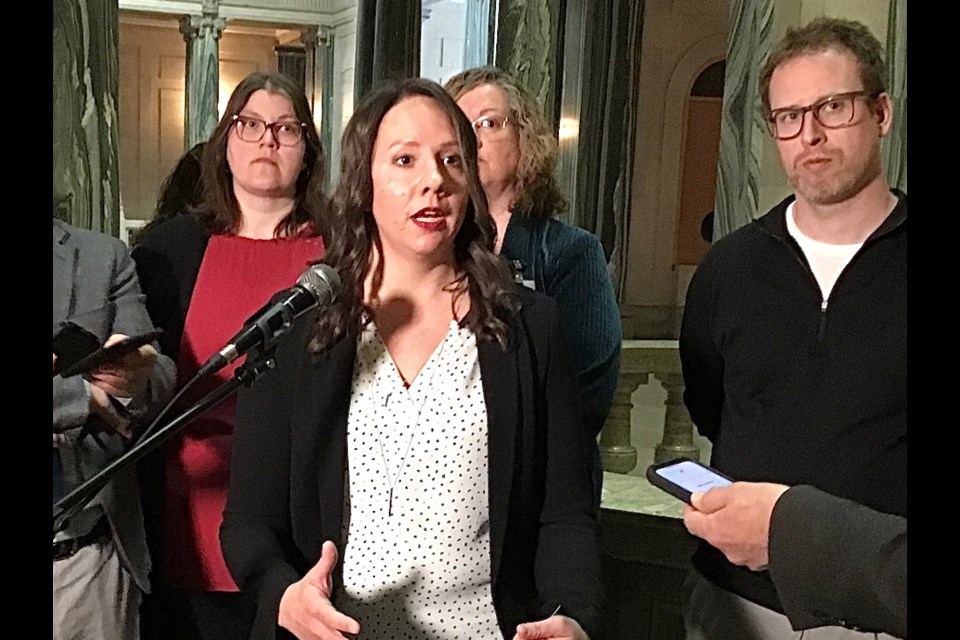REGINA - The pre-budget announcement from Premier Scott Moe of $180 million increased funding to education, and $356 million to classroom supports, has landed with a thud with Saskatchewan Teachers’ Federation.
On Thursday morning, STF made clear in a statement that they “won’t return to the bargaining table or pause job action until the provincial government is willing to embed its most recent promises around class size and complexity into the body of a new provincial collective agreement.”
In response to that statement, Premier Scott Moe told reporters Thursday “that’s their choice — it’s disappointing. Very disappointing.”
“We’re at the table, we’re trying to find points of agreement. We’re going to continue to try and find points of the agreement in the best interests of finding an agreement for our teachers, but also in the best interest of families and students across the province. And I would say the best interest of them right now is for them to have access to the classroom, have access to their extracurricular activities, and the best interest of the STF quite frankly is to return to the table, stay at that table until we find a fair agreement for our teachers and the taxpayers in this province.”
Moe decried the impacts of the continued job action, pointing to the significant amount of disruptions to classrooms in recent years already.
“We have seen recently, or too recently actually, the impacts of children, not having access to the classroom, children not having access to the extracurricular activities that they have, and we’re making every effort we can as a government to place confidence in parents of this province and teachers of this province,” said Moe.
As for STF continued demands that a funding commitment on classroom complexity should be in the collective agreement, Moe made the point that placing the funding in the budget should be enough. He called the budget the “place for this to be” and a contract with the voters, and the “ultimate document for ensuring that funding is going to flow into our education factor, into our healthcare sector.”
As for criticism from STF that what was being proposed was ad hoc funding:
“Budgets are not ad hoc funding,” Moe said. Premier Moe also made it clear the budget commitments on education would not be reduced after the election.
“That is not going to decrease as long as we are the government… If the Saskatchewan Party is the government next year, that number is not going to decrease.”
At the legislature, STF President Samantha Becotte questioned the commitment of the government.
“If government was willing to come to the table ready to make real meaningful commitments — like I said, if they are willing to do it outside the bargaining agreement — there is no reason aside from wanting to not continue, to not put it into the collective agreement.”
Becotte also took issue with government’s characterizations of STF having been at the bargaining table for a grand total of 30 minutes over five months.
“It is inaccurate, We had five full days of conciliation in December and whether the minister doesn't consider that bargaining or not is his prerogative,” said Becotte. “Unfortunately, through the last nine months of bargaining government hasn’t engaged in bargaining. The GTBC has never had the mandate to engage in meaningful back-and-forth conversations.”
Becotte added that she did not see the point of negotiating on all the other items if the government was “not going to negotiate on classroom complexity, because that has been a priority for our members through the entire process.”
Education Minister Jeremy Cockrill said the funding announcement Wednesday “shows our government’s commitment to this next school year and going forward.”
He doubled down on having the classroom size and complexity issue remain out of the collective agreement in speaking to reporters at the legislature.
“We’ve been clear as long as I’ve been in this file that our position is that questions around addressing class-size and complexity are not to be in a provincially bargained agreement. I’ve been very clear on that, the Premier’s been clear on that, at every opportunity government has been clear on that,” said Cockrill.
“However, we also have been clear that we’re going to work with school divisions, and what you see in this announcement in terms of increased operational funding for schools is exactly that: providing additional resources to the 27 school divisions around the province to ensure that those divisions can make decisions and allocate those dollars to address the needs that we see in classrooms.”
In speaking to reporters at the Legislature, Opposition Leader Carla Beck made it known she was unimpressed that the announcement of the education funding was made on social media instead of at the legislature or at the bargaining table.
“This is a government that we’ve said is increasingly showing they are out of touch, they would rather try to change the channel than be accountable to their own decisions. And again, the biggest thing for me with this announcement, and this is what I’m hearing top of mind: the dollar amount almost is secondary to the fact that no one trust their numbers, no one trusts that they’re going to do what they say they’re going to do in education… There’s two billion reasons why the people of this province don’t trust the government on last year’s budget number. Within education, that mistrust goes even deeper.”






